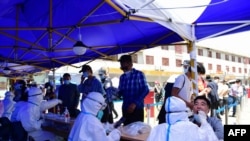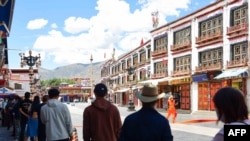Fresh outbreaks of COVID-19 in Xinjiang and Tibet this month have turned China's two western frontier regions into lockdown zones. According to Chinese media, authorities divided the COVID-affected areas of the autonomous regions into high-, medium- and low-risk zones.
Xinjiang reported its first COVID-19 outbreak July 31. One week later, on Aug. 6, Tibet announced some people had been infected.
As of Thursday in Xinjiang, there were 329 high-risk, 138 medium-risk and 24 low-risk areas. On the same day, Chinese authorities in Tibet announced that there were 346 high-risk and 223 medium-risk areas.
According to the Chinese government-affiliated newspaper Global Times, local authorities in Xinjiang and Tibet implemented "static management" in high- and medium-risk areas.
Static management refers to implementing lockdowns in designated risk areas, therefore restricting people's travel outside their homes.
According to a Global Times' report last week, subvariants of the omicron strain from outside China caused COVID-19 infections in both Xinjiang and Tibet.
However, Radio Free Asia reported last week that new infections in both Xinjiang and Tibet were brought by domestic Chinese tourists visiting the regions.
According to Bhuchung Tsering, interim president of the International Campaign for Tibet, even before this recent outbreak of COVID-19, foreign tourists have not been allowed to visit the region.
"Tibet has been largely closed to foreign tourists for several years," he told VOA. "Even though it appears that the COVID outbreak in Lhasa, Shigatse and other towns came about through the presence of travelers to the region, the Tibetan residents have had to bear with the inadequacies of the health care system."
A Uyghur resident in Xinjiang who requested anonymity out of fear of reprisal from the Chinese government told VOA that under the terms of static management, all the people in their apartment building were transferred to an unknown location.
"We were told to go to a quarantine location because they said that a Chinese person who was traced to an infected person earlier came into our building," the Uyghur said. "The next morning, we found out that the quarantine location we were brought to is actually an internment facility for reeducation."
China has been accused of subjecting more than 1 million Uyghurs and other Turkic Muslim ethnic groups in Xinjiang to mass internment, torture, forced labor and forced sterilization. Amnesty International and other rights groups called on China to "release all of [the] people arbitrarily detained in camps and prisons, and for the closure of the internment camps" in Xinjiang.
Beijing first denied the existence of internment camps. Later, it said that those facilities are "vocational education and training centers" to help people affected by "religious extremism, terrorism and separatism" and that all the "students" graduated in late 2019.
China also expanded similar "vocational" programs in Tibet in 2020. Half a million Tibetans were trained and "several thousand" were sent to other parts of China from their traditional livelihoods to work in manufacturing.
According to Peter Irwin, a senior program officer at the Washington-based Uyghur Human Rights Project, Uyghurs have been facing some of the "most intrusive state-imposed surveillance" in the world today.
"COVID lockdown measures give Chinese authorities even more of an excuse to either lock Uyghurs up and heighten surveillance that they are already well-accustomed to," Irwin told VOA.
According to the Chinese government newspaper Xinjiang Daily, on Thursday, Chinese Communist Party Secretary of Xinjiang Ma Xingrui told officials throughout the region that they must thoroughly implement the "spirit of General Secretary Xi Jinping's important speech on epidemic prevention and control."
"Adhere to the goal of zero-COVID policy. Do not relax; do not waver. Strengthen and improve response measures, concentrate superior forces to overcome difficulties, and resolutely win the battle of epidemic prevention and control," Ma said.
According to another Xinjiang resident who requested not to be named because of fear of retaliation by the Chinese government, the government officials sealed his home's door to prevent him from going out.
"They open the seal to conduct daily COVID tests or when they bring daily necessities," he told VOA.
For the Uyghurs, Tibetans and other ethnic groups, this new measure of control adds to the stress that they already face, said Adrian Zenz, director and senior fellow of China studies at the Victims of Communism Memorial Foundation in Washington.
"Given that the Han [Chinese] tend to view these groups as 'dirty' and 'uncivilized,' they will likely face harsher treatment and stricter containment measures during a COVID outbreak," Zenz told VOA.





